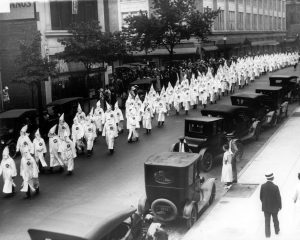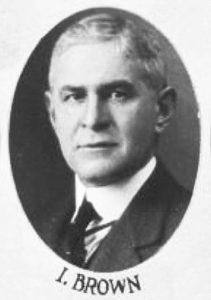
In March 1924 and against the backdrop of a resurgent Ku Klux Klan, Virginia’s House of Delegates passed two notable bills: one forbidding “race amalgamation” and another mandating daily Bible reading in public schools. The Bible bill passed by a lopsided vote of 88 to 5.
“The Knights of the Ku Klux Klan believe that the free public schools should be the vehicle for this [principle of] Bible reading and instruction,” stated a 1920s-era Klan booklet titled Principles and Purposes of the Knights of the Ku Klux Klan. “[N]o atheist, infidel, skeptic, or non-believer should be allowed to teach in the public schools,” the missive continued.
The Bible bill technically provided an opt-out for any child to be excused, upon the request of their parents, from reading the Bible. But it’s easy to imagine the risk families choosing to opt out faced considering Klan membership was, in the words of one historian, “second only to church.”
Among the few brave delegates objecting to forced Bible reading in public schools, John E. Nottingham, a Baptist minister and graduate of the University of Virginia, reminded delegates that America had been founded upon the separation of church and state. “No man on this floor reveres the Bible more than I,” he continued. But from his commitment to constitutional religious freedom, Nottingham declared, “I object seriously to making it compulsory to read any portion of the Bible in the public schools.”
Also bravely rising in defense of church-state separation, Israel Brown, the sole Jewish member among delegates, expressed strong opposition to required Bible reading in public schools. “My people came to this country questing religious freedom,” Brown said. “Here they found it in a land where church and state were separate.” Warning that Bible reading in public schools was “a question of religious freedom,” he suggested “the Bible be taught at home.” The majority lawmakers’ quest to create “sectarian” public schools was misguided, he insisted.
To the joy of Nottingham and Brown, the Virginia Senate voted down the unconstitutional Bible bill. Undeterred, a majority of Virginia delegates doubled down in 1926, passing a revised bill, minus an opt-out clause. In addition, the revised bill expressly required the reading of five Bible verses daily and, in the words of a reporter, “provided a penalty in case the teacher, superintendent or principal failed to carry out its provisions, giving the board of education power to take action on complaint of any person that the law was not being complied with.” One Christian legislator spoke for many when insisting mandated public school Bible reading would eradicate the “deplorable moral conditions” plaguing the state.

Temple in Norfolk. Serving in the Virginia House of Delegates in 1924, he was one of only five delegates opposed to Bible reading in the state’s public schools. (Photo by Virginia.gov)
Brown was no longer in office, depriving the legislature of a dissenting Jewish voice. Baptists, however, were prepared. In the words of one newspaper editor, the General Baptist Association of Virginia — representing 219,166 citizens, or nearly 10 percent of Virginia’s population — “hurled a broadside against the compulsory Bible reading bill” upon its introduction in the Senate. The Baptist “memorial” urged legislators to “adhere to the doctrine, peculiarly bound up with the history of this Commonwealth, which completely separates church from state.”
Invoking the legacy of native sons Thomas Jefferson and James Madison, the Baptist missive pointed to the 1786 enactment of Jefferson’s Virginia Statute for Religious Freedom that in turn led to federal church-state separation in the 1791 First Amendment to the U.S. Constitution.
Not content with petitioning the state’s General Assembly from afar, Baptists also turned to a powerful public figure: George W. McDaniel, pastor of the prestigious First Baptist Church of Richmond. Testifying before lawmakers, McDaniel spoke bluntly. “How have we come thus far in Virginia and made such moral progress without such a [Bible-reading] law?” he asked incredulously. Until now “there has been no attempt of the state to legislate in matters of religion. Religion flourisheth when free and unfettered and unsupported by the state.”
Virginia Baptists of the 1770s and 1780s had “stood unanimously with Thomas Jefferson and James Madison for Disestablishment” of the state church, McDaniel noted. “I stand where they stood,” he continued, taking the high ground. And like Baptists of old, “I contend for an imperishable principle and for a just consideration for the consciences of that minority who do not accept my Bible as the word of God.”
Continuing his history lesson, the Baptist pastor reminded lawmakers that “the United States has made one distinctive contribution to civilization, to wit: the separation of Church and State. In the American arena the freedom of conscience was first incorporated in written law. That means that the State has no religious function.”
“Religion is purely voluntary,” McDaniel continued, appealing to the consciences of his fellow Christians. “That principle runs all through the New Testament. God does not compel anyone to hear or believe. That God does not do, man dare not attempt. Religion is a thing between the soul and God.” Religion, McDaniel continued, “is of such a personal, spiritual, sacred nature that government must not touch it. It is so vital and vigorous that it does not lean upon the prop of the State. Attempts to have the State in some way advance religion are, in the last analysis, a confession of the weakness of religion, which some of us will not admit.”
Driving home Baptists’ long-held religious freedom convictions, the Richmond pastor invoked history. “The Christian religion,” he lectured, “does not need any assistance from the State. Every time the State has touched Christianity, it has tainted it. Every time Christianity has united with the State, corruption has set in. Christianity prospers most when freest.”
McDaniel’s religious and constitutional convictions represented those of most white Baptists a century ago, theologically conservative (as was McDaniel) and liberal alike. But now, a century later, Christian Nationalists — be they Baptist or otherwise — falsely insist that America was founded as a white Christian nation within which white Christians should have dominion over others.
Aggressively opposed to freedom — apart from their own — and dismissive of constitutional church-state separation, America’s Christian Nationalists are devoted to making America theocratic. High on their list of priorities is the dismantling of the federal Department of Education and the transformation of public schools into government-funded institutions of religious indoctrination. In their authoritarian religious quest, they are modeling yesteryear’s colonial American Christian theocracies — as well as modern-day theocracies — in mandating religious indoctrination in public schools.
A century after Baptists and Jews led the way in successfully defending Virginia’s secular public schools, racism and public school religious indoctrination remain the twin platforms of white Christian Nationalism. Leslie Ribovich, director of the Greenberg Center for the Study of Religion in Public Life and Associate Professor of Religious Studies and Public Policy & Law at Trinity College in Hartford, Conn., has studied and written extensively about this unholy pairing. “Teaching the Ten Commandments and Bible in public schools is about race and history,” she summarizes, “not just the First Amendment.”
Editor’s Note: I am indebted to the Rev. Dr. Nathan L. Taylor — Executive Director of the Virginia Baptist Historical Society (VBHS) and the Center for Baptist Heritage & Studies, located at the University of Richmond — for bringing George W. McDaniel’s 1926 address to my attention.